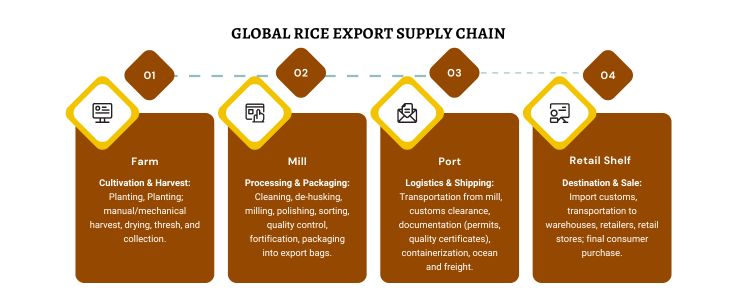Why Indian Rice is the Future of Middle East & USA Food Markets
Rice is more than just a staple grain; it’s an essential aspect of global prevention and preparedness for nourishment and cultural identity. In the Middle East and the U.S., the demand for quality rice is expected to grow, and India is one of the most dependable suppliers. Rice-exporting countries, especially Indian rice exporters, have established themselves over the last decade as exporters, an international destination for both high-quality and bulk rice. Governments, retailers, and consumers now trust the country as a source of rice.
1. The Global Appetite for Indian Rice
India is the world’s leading exporter of rice; all varieties make up almost 40% of the world’s total rice exports. This ranking or stature does not apply to just one type of rice, as Indian rice exporters export both basmati rice and non-basmati rice, each feeding a separate consumer target. For example, basmati rice is preferred in Middle Eastern households, appreciating the aroma and long grain of basmati rice. Whereas non-basmati rice is desired in Africa and Asia because of its value.
In either type of rice, India’s immense or huge capacity or ability to scale its production, maintain quality, and assure the timeliness of products places India in a league above its competitors, such as Thailand.
2. Why the Middle East Depends on Indian Rice
The Middle East has been one of the largest imported of Indian rice for quite some time. The factors supporting this demand are:
- Significance of Rice in Diets: In many Middle Eastern culinary infusions, rice is the cornerstone of meals.
- Cultural Tradition: For generations, Indian basmati has been consumed, creating a product that cannot be substituted.
- Established Supply Chains: Indian exporters have retained existing trade relationships with food providers in the UAE, Saudi Arabia, and the Gulf Countries.

3. Growing Demand in the United States
The U.S. market has been traditionally supported by Latin American rice varieties, but the demand for Indian rice has grown rapidly in recent years. This fast growth can be attributed to several factors:
- Demand from Diaspora: The South Asian population in the U.S. is growing, which is fueling the demand for rice that is authentic to Indian cuisine.
- Premium Store Placement: Grocery chains, grocery stores, and gourmet stores wholesale Indian basmati rice as a premium staple.
- Adaptability: The Indian rice product is appealing to more than just the diaspora household and can be found in restaurants, given that it pairs well with fusion compatibility to home, as well as meal kits.
Strategic partnerships with food suppliers in the USA allow exporters to build upon established exportation distribution networks, thereby providing their customers greater access to Indian rice in a variety of states.
4. Role of Indian Basmati Rice Exporters
The success story of India’s rice trade rests significantly on the shoulders of indian basmati rice exporters. These firms invest heavily in advanced milling, quality control, and international certifications. Their focus on branding, packaging, and compliance with safety standards has helped elevate basmati from a regional staple to a global luxury food product.
For businesses in both the Middle East and the USA, collaborating with such exporters offers not only supply reliability but also consumer confidence.
5. Logistics and Trade Infrastructure
The effectiveness of Indian rice exports is supported by reliable logistics capabilities. Major ports such as Kandla, Mundra, and Kakinada can quickly execute bulk shipments, while containerized shipments can guarantee that premium products reach markets uncompromised.
With global partnerships, including sources in the USA and sourcing companies in the USA, Indian rice can plug in efficiently to retail supply chains. This infrastructure mitigates lag time and fortifies India’s position as the first-choice supplier.
6. The Trust Factor in Indian Rice
Global Buyers increasingly select Indian rice not only for the price point, but for its uniformity as well. Exporters have established credibility for doing so by:
- Maintaining a consistent supply even in circumstances of worldwide disruption.
- Meeting high-quality checks and rigorous food safety regulations.
- Offering a wide variety of styles appealing to both mass and premium consumer bases.
This assurance allows exporters to maintain long-term relationships, particularly in politically unstable areas where food security is vital.
7. Challenges and the Road Ahead
The outlook is positive, but there are challenges exporters face:
- Trade Restrictions: The sporadic bans or trade restrictions adversely affect supply in the short-term.
- Climate Risks: The unreliable monsoons can influence crop yields.
- Competition: Competitors like Pakistan and Thailand are working to capture a share of the basmati and non-basmati market.
Nonetheless, the flexibility of Indian rice export, partnered with government support and the creation of innovative technology, continues to support exporters in reducing these risks
8. Opportunities for Global Food Businesses
For global players, the increase in Indian rice exports presents opportunities on several fronts:
- Private Label Partnerships: Retailers in the U.S. and UAE can sell labeled rice.
- Supply Security: Exporters ensure continuity through long-term contracts.
- Value-Added Products: Ready-to-cook meals, organic meals, and fortified rice represent new revenue opportunities.
- Market Expansion: Businesses can utilize India’s known routes to reach not only the primary markets but also expand into Africa and Europe.
Conclusion
The future of rice consumption in the Middle East and the USA is closely connected to India’s agricultural strength and trade resilience. From Gulf cultural familiarity to increasing across ethnically diverse US consumers, Indian rice now has a unique place across global tables.
The role of Indian rice exporters will remain pivotal in the evolution of this uncertainty. Their success in balancing tradition with innovation, backed by assured quality and reliability of supply, secures India’s pre-eminent position in global food trade.
This emerging trend is simple for anyone in business globally – Indian rice is not just a commodity, it represents the future of food markets in two of the most dynamic markets on earth.
Frequently Asked Questions (FAQ)
They are structured services to support businesses in finding, evaluating, and managing suppliers to optimize costs, quality, and compliance.
It provides access to competitive manufacturing capabilities while being able to adapt to changing consumer needs.
Pharmaceuticals sourcing is compliance-driven, and an acknowledgment is needed for rules and standards to be met that are often above safety regulations.
Agents act as intermediaries to find and connect businesses with reputable suppliers, negotiate pricing, lead times, and mailing logistics.
Agencies provide solutions from supplier vetting to managing compliance and scaling.
No, even small and medium-sized enterprises (SME’s) see great benefit, especially when growing internationally or within regulated industries.









